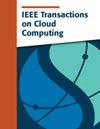A Publicly Verifiable Outsourcing Matrix Computation Scheme Based on Smart Contracts
IF 5.3
2区 计算机科学
Q1 COMPUTER SCIENCE, INFORMATION SYSTEMS
引用次数: 0
Abstract
Matrix computation is a crucial mathematical tool in scientific fields such as Artificial Intelligence and Cryptographic computation. However, it is difficult for resource-limited devices to execute large-scale matrix computations independently. Outsourcing matrix computation (OMC) is a promising solution that engages a cloud server to process complicated matrix computations for resource-limited devices. However, existing OMC schemes lack public verifiability, and thus resource-limited devices cannot verdict the correctness of the computing results. In this paper, for the first time, we propose a smart contract-based OMC scheme that publicly verifies the outsourcing matrix computation results. In our scheme, a smart contract running over the blockchain serves as a decentralized trusted third party to ensure the correctness of the matrix computation results. To overcome the Verifier's Dilemma in the blockchain, we present a blockchain-compatible matrix verification method that decreases the time complexity from基于智能合约的可公开验证的外包矩阵计算方案
矩阵计算是人工智能和密码计算等科学领域的重要数学工具。然而,资源有限的设备很难独立执行大规模矩阵计算。矩阵计算外包(OMC)是一种很有前景的解决方案,它利用云服务器为资源有限的设备处理复杂的矩阵计算。然而,现有的 OMC 方案缺乏公开可验证性,因此资源有限的设备无法确定计算结果的正确性。在本文中,我们首次提出了一种基于智能合约的 OMC 方案,可公开验证外包矩阵计算结果。在我们的方案中,运行在区块链上的智能合约作为去中心化的可信第三方,确保矩阵计算结果的正确性。为了克服区块链中的验证者困境,我们提出了一种与区块链兼容的矩阵验证方法,通过利用校验码和填充矩阵的盲法,将时间复杂度从$O(n^{3})$降低到$O(n^{2})$。我们将验证变成了比较两个结果是否相同的形式,而不是天真的重新计算。最后,我们在以太坊和 ARM Cortex-M4 上进行了实验,并给出了深入分析和性能评估,证明了我们方案的实用性和有效性。
本文章由计算机程序翻译,如有差异,请以英文原文为准。
求助全文
约1分钟内获得全文
求助全文
来源期刊

IEEE Transactions on Cloud Computing
Computer Science-Software
CiteScore
9.40
自引率
6.20%
发文量
167
期刊介绍:
The IEEE Transactions on Cloud Computing (TCC) is dedicated to the multidisciplinary field of cloud computing. It is committed to the publication of articles that present innovative research ideas, application results, and case studies in cloud computing, focusing on key technical issues related to theory, algorithms, systems, applications, and performance.
 求助内容:
求助内容: 应助结果提醒方式:
应助结果提醒方式:


